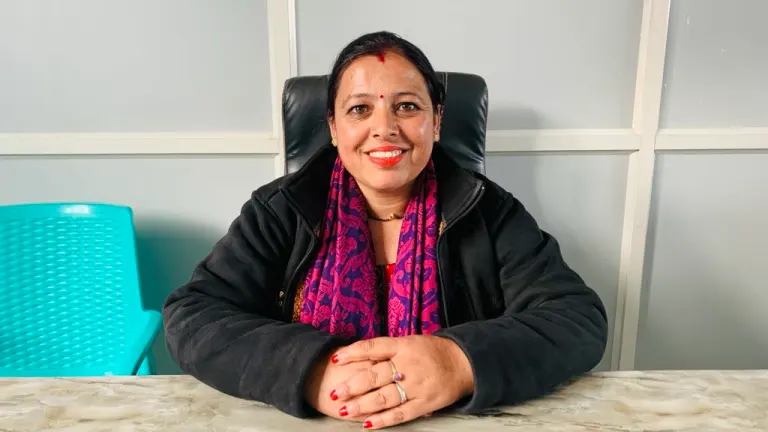KATHMANDU: Geography can quantify distances, but it fails to measure the resilience of Lalita Lamichhane.
Her path was marked by honor, humiliation, and ultimately, triumph.
Losing her foster father early in life forced Lalita to shoulder responsibilities beyond her years, as the mantle of raising the family fell upon her single mother.
Got married at the tender age of 14, Lalita’s journey was one of overcoming adversities that seemed insurmountable.
Transitioning from her birth home to her husband’s house, Lalita exchanged the comfort of a family of five for a joint family of 24.
The shift was seismic, akin to the sky falling on her head and the ground beneath her feet being washed away.
Stuck in a tunnel of unexpected challenges, Lalita’s experiences diverged drastically from her expectations.
From books to grass fields, shepherd farms, and kitchen chores, her journey was a stark departure from the academic pursuits of her peers.
Life became a relentless cycle of roles—someone’s sister-in-law, someone’s daughter-in-law, someone’s aunt, and someone’s sister-in-law.
Realizing her strengthened claim over her household rights after becoming a mother, she stumbled upon an opportunity during a shopping trip to Farping market.
Amidst these demands, Lalita found solace in the routine, copying newspapers brought by her husband and reading aloud to satiate her thirst for knowledge and wisdom.
Even in the face of adversity, she believed that this daily ritual would quench her intellectual thirst, serving as a beacon of hope and preventing frustration from taking root.
One day, Lalita implored her husband to allow her to pursue further studies. His response was dismissive, “You have to ask your mother.”
Frustrated by the lack of support, Lalita decided to abandon the notion of seeking approval from the family.
However, as her sister-in-law and brother-in-law returned home from school, her interest in education rekindled.
The threads of writing, movement, and reading, far from breaking, only intensified.
The idea of rebellion occasionally crossed her mind, but the fear of being ousted from her home loomed large. Her parent’s condition added to her concerns.
Balancing the roles of daughter, daughter-in-law, and now a mother of two, Lalita feared that her dream of raising children might wither away.
Despite these challenges, her hunger for self-study drove her to actively participate in the village women’s group and microfinance programs, from taking minutes to conducting the programs.
Lalita sought out gatherings of women, proudly declaring her SLC pass when questioned about her education, but the pressure to continue studying persisted.
During festival visits to her parent’s home in Bhaktapur, while her friends returned from Kamalbinayak Campus with college bags, Lalita carried her baby.
The fear of her child crying in public, exposing her struggle, weighed heavily on her. She avoided looking at her friends out of shame.
A decade after leaving school, Lalita, overcoming societal and familial barriers, boldly returned to the classroom.
She asserts that it is feasible to pursue education while managing household duties, challenging the notion that accomplishing one’s goals hinges on achieving perfection in every aspect.
Graduating from an open school with excellent marks, she celebrated the activism of Shashi Sharma Aryal, who facilitated the establishment of the open school.
As her children grew, Lalita contemplated whether the path to Gyan Ganga was now open for her.
Realizing her strengthened claim over her household rights after becoming a mother, she stumbled upon an opportunity during a shopping trip to Farping market.
A poster on a house wall announced, ‘Enrollment in the open school has opened.’ This time, Lalita didn’t hesitate to make a decision.

A decade after leaving school, she broke through the barriers imposed by her husband, society, and relatives, reentering the classroom directly. Lalita applauded Shashi Sharma Aryal’s activism that made it possible.
Having left school at 14, Lalita embarked on her next chapter of studies at the age of 24.
Seeing her older classmates stirred memories of her past, but after three months of dedicated effort, she successfully caught up with the rest of the class.
As her two children left for their studies, the villagers were astonished.
Some questioned her character, recalling her past struggles. Lalita, however, remained resolute, recalling the determination that once led her to break down doors in pursuit of her goals.
Despite attempts to dissuade others by misinterpreting Pashupati Sharma’s songs, Lalita persevered, undeterred by challenges on her educational journey.
Lalita, with a 16-year-old son and a 22-year-old daughter, basks in the eloquent praise of her children, who extol her resilient journey.
In society’s eyes, she has become the epitome of success. Those who once overlooked her while heading to school are now her admirers, and even her husband shares in the joy, securing a prominent position in the village’s social, cultural, and developmental endeavors.
Lalita’s message resonates profoundly with Nepali women—she advocates for women to prove their worth to society.
Echoing the wisdom of the Bhagawat Gita, she embodies the societal need for individuals like herself—Lalitas who undertake endeavors without expecting immediate rewards, fostering a spirit of selfless contribution to the community.
Had she given up after attempting to study, remaining confined to domestic responsibilities, the conversations about her would have ceased.
Post-marriage, societal expectations suggested there was no room for further achievements, but Lalita has proven otherwise.
She asserts that it is feasible to pursue education while managing household duties, challenging the notion that accomplishing one’s goals hinges on achieving perfection in every aspect.
Lalita’s influence extends across various spheres, from village development and cooperatives to women’s groups and educational activities.
She stands as an inspiration for those who wish to embark on educational pursuits later in life.
Encouraging her sisters to advance fearlessly despite criticism, she likens their resilience to a rock eroded by water, emphasizing that knowledge is an invincible weapon.
Lalita staunchly believes in the correlation between educated mothers and high-class upbringing for their children.
Education, in Lalita’s perspective, not only increases knowledge but also enhances self-strength, fostering leadership and capacity development.
She dispels the misconception of age as a hindrance to education, declaring, “Age is just a number. We can read at any age,” igniting the spirits of those aspiring to achieve something at any stage of life.
Lalita represents a typical character from a middle-class family, illustrating through her past that the struggle should be with oneself and not with others.
Echoing the wisdom of the Bhagawat Gita, she embodies the societal need for individuals like herself—Lalitas who undertake endeavors without expecting immediate rewards, fostering a spirit of selfless contribution to the community.









Comment